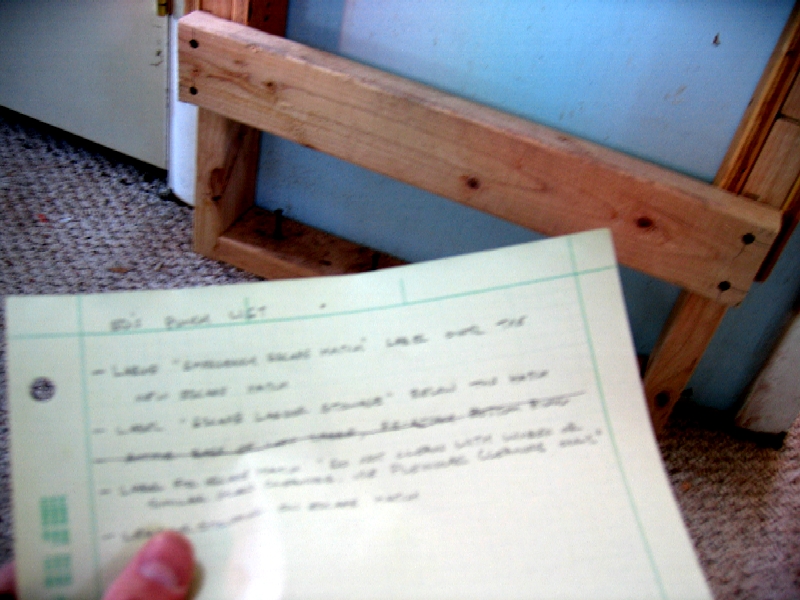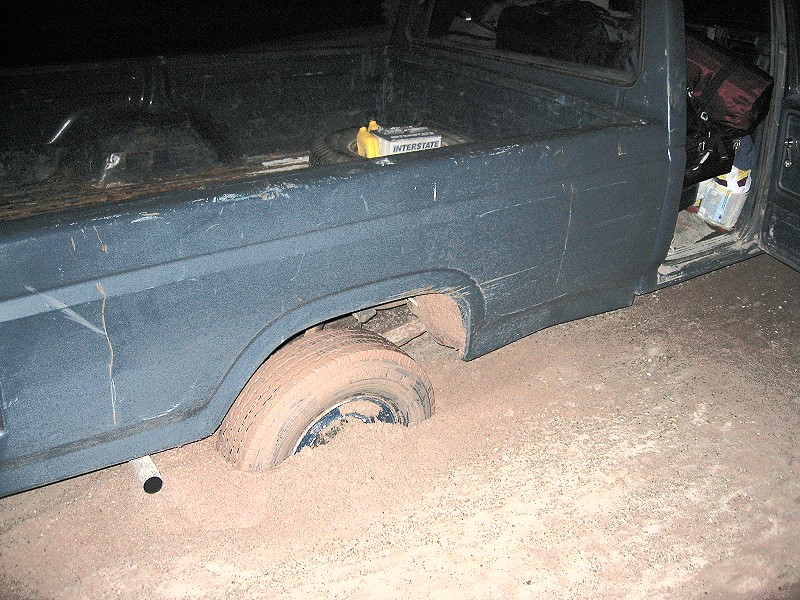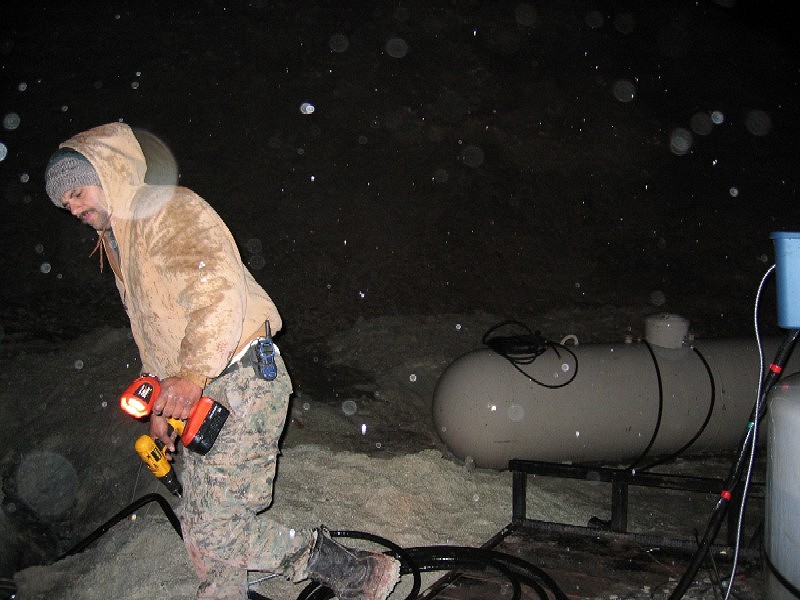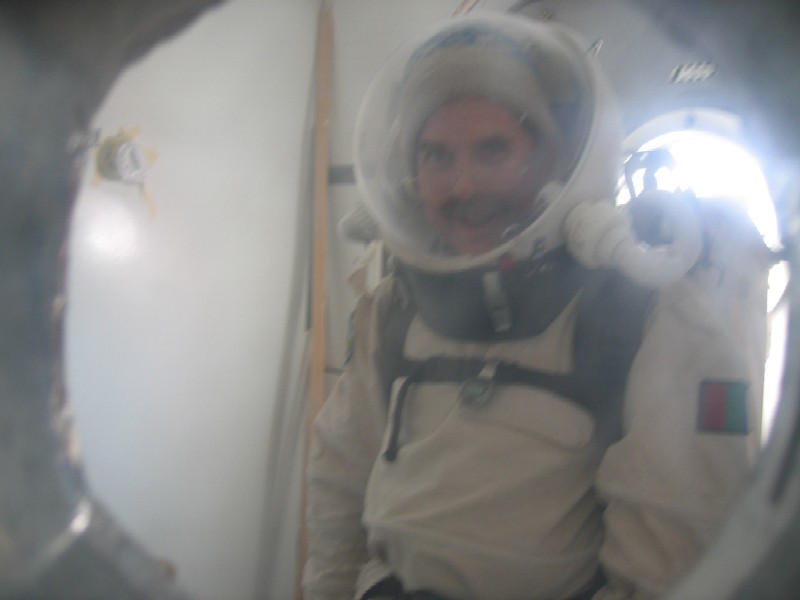Morning Pages. Work. Class. Webcomic. Novel. Sandi. Research. Development. Sangreal. Reading. Drawing. Writing. Houseshopping. Packing. Treadmilling. Waiting for arm to heal so I can go karate-ing. Coffeehousing. Klatching. Whining. Blogging. Sleeping.
Repeat.
Posts tagged as “Mission to Mars”
As I write this I've just reviewed a mountain of unfinished work from the MDRS: stacks of papers, unfinished reports, uncollated photos --- and even the essay I planned to write upon ARRIVING at the MDRS.
This, for me, was one of the Big Lessons from Mars: You Can't Do Everything. I should have learned this from my days as an undergraduate at Georgia Tech --- when the same lesson was called Sometimes You Have To Punt --- but you learn this in force on Mars, even analogue Mars. There are too many tasks and too few hours in the day and, more importantly, people who depend on you to get up the next morning and refuel the generator, cook the food, or join them on an EVA --- so you can't even cheat yourself by staying up late to finish Just One More Task. You have to set a time, get done what you can get done, and go to bed so you can get up in the morning and tackle the next day's tasks, which are coming fast and will not retreat.
There are other Big Lessons from Mars --- such as Everybody Has To Learn To Get Along, You Don't Need So Much Stuff, All Leftovers Go Good In Tomato Soup, Duct Tape Solves Everything, and Everything You Pour Down The Drain Will Reappear In the Greenhab (aka There's No Away To Throw Things To) --- but You Can't Do Everything is the big one. You have to gather your punch list, prioritize, and pick the most urgent tasks. And there's no time for anything else ...
... almost no time, that is. The truth is, there's a dozen short moments during the day in which you're neither too busy to do anything and not tired enough to do nothing, and in those moments you can sit around waiting for your EVA partner to find his gaiters or you can sweep the stairs, organize the battery drawer, or tackle any of a number of small tasks that need to get done but fall off the punch list. The little things. The fit and finish.
So I felt unaccountably proud when, after finishing my packing, I had a few minutes to myself --- and took that time to clean up the Habcom desk, which gave me the space to move the Medical books from a scrap of floor onto a real shelf, which in turn gave me a place to put our supplies of UHT soy, which in turn FINALLY opened up the space on the floor at the bottom of the stepladder. And so then, after over 10 days, I was finally able to dig out the missing bottom stair of the stepladder and screw that sucker into place.

*the sound of a line being crossed off*
And with that, I crossed a punch list item that had been hanging around since Crew 34 left. It's not much of an accomplishment, I admit, but it's still an accomplishment --- one small victory against the forces of entropy, even if only for a little while.
-the Centaur
This, for me, was one of the Big Lessons from Mars: You Can't Do Everything. I should have learned this from my days as an undergraduate at Georgia Tech --- when the same lesson was called Sometimes You Have To Punt --- but you learn this in force on Mars, even analogue Mars. There are too many tasks and too few hours in the day and, more importantly, people who depend on you to get up the next morning and refuel the generator, cook the food, or join them on an EVA --- so you can't even cheat yourself by staying up late to finish Just One More Task. You have to set a time, get done what you can get done, and go to bed so you can get up in the morning and tackle the next day's tasks, which are coming fast and will not retreat.
There are other Big Lessons from Mars --- such as Everybody Has To Learn To Get Along, You Don't Need So Much Stuff, All Leftovers Go Good In Tomato Soup, Duct Tape Solves Everything, and Everything You Pour Down The Drain Will Reappear In the Greenhab (aka There's No Away To Throw Things To) --- but You Can't Do Everything is the big one. You have to gather your punch list, prioritize, and pick the most urgent tasks. And there's no time for anything else ...
... almost no time, that is. The truth is, there's a dozen short moments during the day in which you're neither too busy to do anything and not tired enough to do nothing, and in those moments you can sit around waiting for your EVA partner to find his gaiters or you can sweep the stairs, organize the battery drawer, or tackle any of a number of small tasks that need to get done but fall off the punch list. The little things. The fit and finish.
So I felt unaccountably proud when, after finishing my packing, I had a few minutes to myself --- and took that time to clean up the Habcom desk, which gave me the space to move the Medical books from a scrap of floor onto a real shelf, which in turn gave me a place to put our supplies of UHT soy, which in turn FINALLY opened up the space on the floor at the bottom of the stepladder. And so then, after over 10 days, I was finally able to dig out the missing bottom stair of the stepladder and screw that sucker into place.

*the sound of a line being crossed off*
And with that, I crossed a punch list item that had been hanging around since Crew 34 left. It's not much of an accomplishment, I admit, but it's still an accomplishment --- one small victory against the forces of entropy, even if only for a little while.
-the Centaur
On practically my first night I did something I'll not likely do when on a real Mars mission: stand out in the rain at 3 in the morning holding a flashlight.
The purpose of the MDRS is twofold. First is science: the MDRS station, and the Flashline and upcoming Euromars stations as well, enable us to test our ideas about living and working on Mars. Part of this is "analog science": How to build a habitat. How to staff a habitat. How to do geology in a spacesuit. And another part of this is "real science": Studying supernovas. Studying closed-quarters reaction times. Looking for life on Earth in places similar to that we can look on Mars.
But the second purpose is just as important: culture. We are engaged in an ongoing psychodynamic experiment in which the Mars Society is learning how to staff a Mars habitat. What kinds of people work together well. What kinds of people work together poorly. And, as we found out, how people react to adversity. Now, we didn't encounter any polar bears at MDRS, nor did major chunks of our habitat litho-brake into the ground when their parachute failed. HOWEVER, we've still had our own little adventures.
I already told the story of how we had wrong directions and coordinates for the trip down to MDRS, about how I nearly got the truck bogged in the mud, and how he then took over as an experienced offroad driver to PROFESSIONALLY get the truck bogged in the mud up to its hips.

So we arrived at the station at approximately 7am, about 12 hours late from our original arrival time and 6 hours later than our revised arrival time (prior to finding out we needed to pick up supplies and drop off a generator in SLC before we left). What got left out of that report was that the Engineering Refit Crew was NOT done when we arrived and the Hab was a gianormous mess. I got the feeling that the Mars Society could easily have put TWO refit crews on site for FOUR weeks and still they'd have had plenty of stuff to do for the duration, and after talking to the refit commander, Paul Graham (not THAT Paul Graham, mind you), about what he thought needed to be done to the site, I think my original estimate is conservative.
So two of the refit crew, Paul Graham and Artemis Westenberg, stayed on with us for several days trying to help out with a number of issues. Hugh threw the whole crew, with a few exceptions for Dr. Broering who had to leave early, behind the refit. And on the last day, after a whirlwhind of cleaning, the major issues at the Hab (like having power, drinking water, and the ability to take a dump) were all resolved.
Except ...
On the last night they were scheduled to be there, Paul burned the midnight oil trying to resolve a few outstanding issues. This involved running conduits (smurf pipe), running wire, and working his ass off on the most important part, the water pump. During all of this I followed everyone around with my clipboard and digital camera, basically pretending to be a handheld computer as part of my information system assistant project (when my hands were not needed running the aforementioned smurf pipe). The hardest task was the pump: Paul and Kevin Saka and the rest of the team worked for hours getting it right --- the wiring, the fittings, the remote switch --- and finally they got it.
Except ...
We threw the remote switch at the end of the day, trying to feed enough water into the GreenHab to keep our recycler (and thus our toilet) alive. But no water ran. Paul cursed. It had worked before! And he's not one to leave a task undone. And I'm not one to let someone go out into the night at 3am alone in cougar country, even if he is a 6 foot 4 marine who can take care of himself. So I picked up Little Blue (my giant Brinksman flashlight), grabbed my "Indiana Jones" hat, and headed out into the dark with Paul to fix the water pump.

Which returns us to something you're not likely to do on a real Mars mission: stand out in the rain at 3 in the morning holding a flashlight. On second thought, maybe you ARE likely to do that on a Mars mission, if not in the rain holding a flashlight, but in the sandstorms wearing a spacesuit, helping a friend fix part of the generator or recycler or airplant, doing what you need to do because it HAS to get done or no-one will survive.
But you do it. It gets done. And because you do what needs to be done without hesitation, everyone survives.
Welcome to Mars.
The purpose of the MDRS is twofold. First is science: the MDRS station, and the Flashline and upcoming Euromars stations as well, enable us to test our ideas about living and working on Mars. Part of this is "analog science": How to build a habitat. How to staff a habitat. How to do geology in a spacesuit. And another part of this is "real science": Studying supernovas. Studying closed-quarters reaction times. Looking for life on Earth in places similar to that we can look on Mars.
But the second purpose is just as important: culture. We are engaged in an ongoing psychodynamic experiment in which the Mars Society is learning how to staff a Mars habitat. What kinds of people work together well. What kinds of people work together poorly. And, as we found out, how people react to adversity. Now, we didn't encounter any polar bears at MDRS, nor did major chunks of our habitat litho-brake into the ground when their parachute failed. HOWEVER, we've still had our own little adventures.
I already told the story of how we had wrong directions and coordinates for the trip down to MDRS, about how I nearly got the truck bogged in the mud, and how he then took over as an experienced offroad driver to PROFESSIONALLY get the truck bogged in the mud up to its hips.

So we arrived at the station at approximately 7am, about 12 hours late from our original arrival time and 6 hours later than our revised arrival time (prior to finding out we needed to pick up supplies and drop off a generator in SLC before we left). What got left out of that report was that the Engineering Refit Crew was NOT done when we arrived and the Hab was a gianormous mess. I got the feeling that the Mars Society could easily have put TWO refit crews on site for FOUR weeks and still they'd have had plenty of stuff to do for the duration, and after talking to the refit commander, Paul Graham (not THAT Paul Graham, mind you), about what he thought needed to be done to the site, I think my original estimate is conservative.
So two of the refit crew, Paul Graham and Artemis Westenberg, stayed on with us for several days trying to help out with a number of issues. Hugh threw the whole crew, with a few exceptions for Dr. Broering who had to leave early, behind the refit. And on the last day, after a whirlwhind of cleaning, the major issues at the Hab (like having power, drinking water, and the ability to take a dump) were all resolved.
Except ...
On the last night they were scheduled to be there, Paul burned the midnight oil trying to resolve a few outstanding issues. This involved running conduits (smurf pipe), running wire, and working his ass off on the most important part, the water pump. During all of this I followed everyone around with my clipboard and digital camera, basically pretending to be a handheld computer as part of my information system assistant project (when my hands were not needed running the aforementioned smurf pipe). The hardest task was the pump: Paul and Kevin Saka and the rest of the team worked for hours getting it right --- the wiring, the fittings, the remote switch --- and finally they got it.
Except ...
We threw the remote switch at the end of the day, trying to feed enough water into the GreenHab to keep our recycler (and thus our toilet) alive. But no water ran. Paul cursed. It had worked before! And he's not one to leave a task undone. And I'm not one to let someone go out into the night at 3am alone in cougar country, even if he is a 6 foot 4 marine who can take care of himself. So I picked up Little Blue (my giant Brinksman flashlight), grabbed my "Indiana Jones" hat, and headed out into the dark with Paul to fix the water pump.

Which returns us to something you're not likely to do on a real Mars mission: stand out in the rain at 3 in the morning holding a flashlight. On second thought, maybe you ARE likely to do that on a Mars mission, if not in the rain holding a flashlight, but in the sandstorms wearing a spacesuit, helping a friend fix part of the generator or recycler or airplant, doing what you need to do because it HAS to get done or no-one will survive.
But you do it. It gets done. And because you do what needs to be done without hesitation, everyone survives.
Welcome to Mars.
Juggling the archives, here's our very first shot of our very first EVA, a few days ago when we were still jetlagged and travel tired!

Hugh donned his spacesuit to help out the refit team by taking out the garbage "in sim". More to come...

Hugh donned his spacesuit to help out the refit team by taking out the garbage "in sim". More to come...
I have touched down in Salt Lake City, our stand-in for the Orbiting Mars Way Station that will receive future visitors to the Red Planet. Still don't know if we'll have email, but things are getting closer and closer. Our crew is forming up:
http://www.marssociety.org/MDRS/fs04/crew35/
And we're getting ready to hop in our Mars Orbit-To-Surface transport vehicle (the big old MDRS van) and send our first crew out to the station! More news as it happens.
Ad Ares!
http://www.marssociety.org/MDRS/fs04/crew35/
And we're getting ready to hop in our Mars Orbit-To-Surface transport vehicle (the big old MDRS van) and send our first crew out to the station! More news as it happens.
Ad Ares!

Well, it's official: the crew is set and I'm on my way to Mars tomorrow morning! You can check us out starting the 21st of February at: MDRS Daily Field Reports or MDRS Home!
Ad Ares!